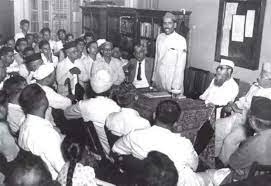The First Judge Case, also known as the S.P. Gupta case, was a landmark judgment delivered by the Supreme Court of India in 1981. The case dealt with the question of the independence of the judiciary and the powers of the executive in appointing and transferring judges.

Table of Contents
Background of First Judge Case
The First Judge Case arose out of a dispute between the Chief Justice of India and the Government of India over the appointment and transfer of judges. The government had issued certain executive orders that gave it the power to appoint and transfer judges without consulting the Chief Justice of India.
Arguments
The Chief Justice of India and several other senior judges of the Supreme Court challenged these orders in the court, arguing that they violated the principle of separation of powers and the independence of the judiciary. The government, on the other hand, argued that it had the power to make such orders under the Constitution.
Judgment First Judge Case
In its judgment, the Supreme Court held that the power to appoint and transfer judges lay with the judiciary and not with the executive. The court held that the executive could not make such appointments and transfers without consulting the Chief Justice of India and the other senior judges.
The court also held that the principle of separation of powers was a fundamental feature of the Constitution, and that the independence of the judiciary was essential for upholding the rule of law.
Impact
The First Judge Case had a significant impact on the appointment and transfer of judges in India. It established the primacy of the judiciary in these matters and strengthened the principle of judicial independence.
The judgment also led to the creation of the collegium system for the appointment of judges, which is still in use today. The collegium system consists of a group of senior judges who make recommendations to the government for the appointment and transfer of judges.
Conclusion
The First Judge Case was a landmark judgment that upheld the independence of the judiciary and strengthened the principle of separation of powers in India. The judgment had a lasting impact on the appointment and transfer of judges, and led to the creation of the collegium system, which has become an integral part of the Indian judiciary.
Important Links